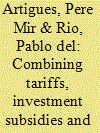|
|
|
Sort Order |
|
|
|
Items / Page
|
|
|
|
|
|
|
| Srl | Item |
| 1 |
ID:
115133


|
|
|
|
|
| Publication |
2012.
|
| Summary/Abstract |
A choice experiment exercise is combined with psychometric scales in order: (1) to identify factors that explain support/opposition toward a wind energy development project; and (2) to assess (monetary) trade-offs between attributes of the project. A Latent Class estimator is fitted to the data, and different utility parameters are estimated, conditional on class allocation. It is found that the probability of class membership depends on specific psychometric variables. Visual impacts on valued sites are an important factor of opposition toward a project, and this effect is magnified when identity values are attached to the specific site, so much that no trade-off would be acceptable for a class of individuals characterized by strong place attachment. Conversely, other classes of individuals are willing to accept compensations, in form of private and/or public benefits. The distribution of benefits in the territory, and preservation of the option value related to the possible development of an archeological site, are important for a class of individuals concerned with the sustainability of the local economy.
|
|
|
|
|
|
|
|
|
|
|
|
|
|
|
|
| 2 |
ID:
132678


|
|
|
|
|
| Publication |
2014.
|
| Summary/Abstract |
Policy combinations and interactions have received a considerable attention in the climate and energy policy realm. However, virtually no attention has been paid to the analysis of the combination of different deployment instruments for the same renewable energy technology. This neglect is all the more striking given the existence in current policy practice of combinations of deployment instruments either across technologies or for the same technology, both in the EU and elsewhere. What renewable electricity support policies to use and, therefore, how to combine them in order to promote the deployment of renewable energy technologies cost-effectively is a main concern of governments. The aim of this paper is to provide insight on the cost-effectiveness of combinations of deployment instruments for the same technology. A financial model is developed for this purpose, whereby feed-in tariffs (FITs) are combined with investment subsidies and soft loans. The results show that the policy costs of combinations are the same as for the FITs-only option. Therefore, combining deployment instruments is not a cost-containment strategy. However, combinations may lead to different inter-temporal distributions of the same amount of policy costs and, thus, differently affect the social acceptability and political feasibility of renewable energy support.
|
|
|
|
|
|
|
|
|
|
|
|
|
|
|
|
| 3 |
ID:
136240


|
|
|
|
|
| Summary/Abstract |
Community views toward the risks and benefits of emerging renewable energy technologies are important factors in facility siting decisions and their eventual success. While the actual socioeconomic and biophysical impacts of proposed industrial developments are fraught with uncertainty, understanding public perceptions is critical in managing costs and benefits to local citizens. Here, we explore the social acceptability of forest-based biorefineries in Maine using random utility modeling to identify how project attributes and citizen characteristics interact to affect level of support. Using a statewide sample (Statewide) and a subsample of mill towns (Mill Towns), we found that: (1) in both samples, individual characteristics had similar coefficients and significance levels except for pro-environment attitudes; (2) the coefficients related to the industry’s negative attributes were notably different between the two samples, while positive attributes were not; (3) in both samples, positive industry attributes such as “producing products from a sustainable resource” and “increased economic development” were the most influential variables in determining the level of support for a new biorefinery in an individual’s community; and (4) in general, Mill Town respondents were more accepting of potential negative attributes such as increased levels of truck traffic, odor, noise, and air and water pollution.
|
|
|
|
|
|
|
|
|
|
|
|
|
|
|
|
| 4 |
ID:
099285


|
|
|
|
|
| Publication |
2010.
|
| Summary/Abstract |
In 2008, the UK government undertook a review of personal carbon trading (PCT) and declared that it was 'an idea currently ahead of its time'. PCT is a radical policy proposal which would entail all adults receiving an equal, tradable carbon allowance to cover emissions from household energy and/or personal travel. The allowance would reduce over time, in line with national emissions reduction goals. The government's key concerns about PCT were its social unacceptability and high cost. This paper reviews the literature and identifies knowledge gaps, and then discusses whether these concerns are justified. Contrary to the government's conclusions, most research shows PCT to be at least as socially acceptable as an alternative taxation policy. People think it could be both fair and effective. Set-up and running costs for PCT will undoubtedly be higher than for alternative taxation policies. However, PCT could deliver benefits from individual and social change motivated by non-economic aspects of the policy. These potential benefits are outlined here. The conclusion is that PCT is a promising and timely policy idea.
|
|
|
|
|
|
|
|
|
|
|
|
|
|
|
|
|
|
|
|
|